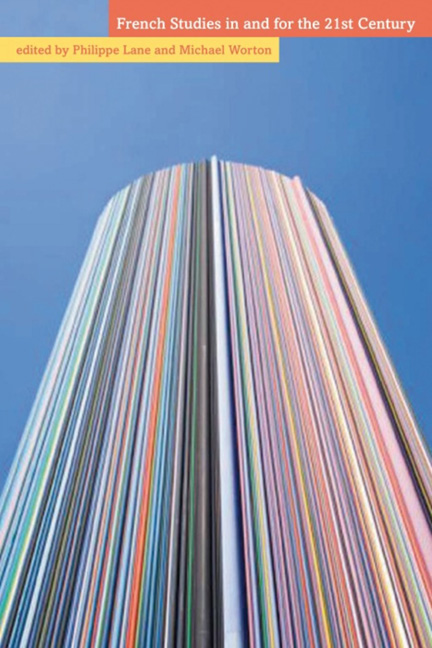Book contents
- Frontmatter
- Contents
- Notes on Contributors
- Foreword
- Foreword by His Excellency
- Part I: Contextualisations
- Part II: Research and Public Engagement Strategies
- Part III: The Place of Women and Gender in French Studies
- Part IV: The Place of Literature
- Part V: The Place of Linguistics in French Studies Today
- Part VI: Theatre, Cinema and Popular Culture
- 14 Teaching and Research in French Cinema
- 15 Popular Culture, the Final Frontier: How Far Should We Boldly Go?
- Part VII: Area Studies, Postcolonial Studies and War and Culture Studies
- Part VIII: Adventures in Language Teaching
- Appendices. Addresses to the Future of French Studies Conference
14 - Teaching and Research in French Cinema
from Part VI: Theatre, Cinema and Popular Culture
- Frontmatter
- Contents
- Notes on Contributors
- Foreword
- Foreword by His Excellency
- Part I: Contextualisations
- Part II: Research and Public Engagement Strategies
- Part III: The Place of Women and Gender in French Studies
- Part IV: The Place of Literature
- Part V: The Place of Linguistics in French Studies Today
- Part VI: Theatre, Cinema and Popular Culture
- 14 Teaching and Research in French Cinema
- 15 Popular Culture, the Final Frontier: How Far Should We Boldly Go?
- Part VII: Area Studies, Postcolonial Studies and War and Culture Studies
- Part VIII: Adventures in Language Teaching
- Appendices. Addresses to the Future of French Studies Conference
Summary
Teaching and research in French cinema has developed rapidly in a relatively short time since the mid- to late 1970s. At that time, teaching was confined to the occasional course unit in a handful of universities, and research was only just starting to emerge from work aimed at cinephile rather than academic readerships. This chapter starts by considering the ways in which teaching has evolved over that time, and then gives an account of developments in research, with a strong focus on the UK, but also taking into account work done in France and the USA.
Teaching
We can make four key points about the teaching of French cinema in UK higher education institutions:
• There are about 60 staff teaching and researching French cinema, and these can be found both in departments of French and of film in UK universities.
• In both types of department, French cinema is frequently taught as part of broader film historical or thematic units, such as ‘modern European film’, ‘film analysis’, or ‘gender in film’.
• Many units on French cinema are taught to non-French language specialists.
• Discrete units labelled as French cinema tend to be generic ‘histories’ of the French cinema or broad introductions, where the films studied can be very variable. Beyond that, the most frequent areas of study across all units, whether general cinema or specifically French cinema, and across the UK, USA and France, are the 1930s Poetic Realist films (with a particular emphasis on Renoir), and The New Wave (with a particular emphasis on Godard).
Several of these points emerge from Keith Reader's account of teaching the subject in the following section. Since it is not always easy to disentangle the teaching of French cinema from the teaching of cinema more generally, it is worth giving a brief historical background for the latter.
Film studies emerged as a fledgling discipline towards the end of the 1960s, largely as a result of the expansion of the university system and the interrogation of the traditional disciplines. Cinephiles began to integrate the study of cinema in programmes of literature or fine art, generally as optional units within a broader curriculum.
- Type
- Chapter
- Information
- French Studies in and for the 21st Century , pp. 171 - 183Publisher: Liverpool University PressPrint publication year: 2011



